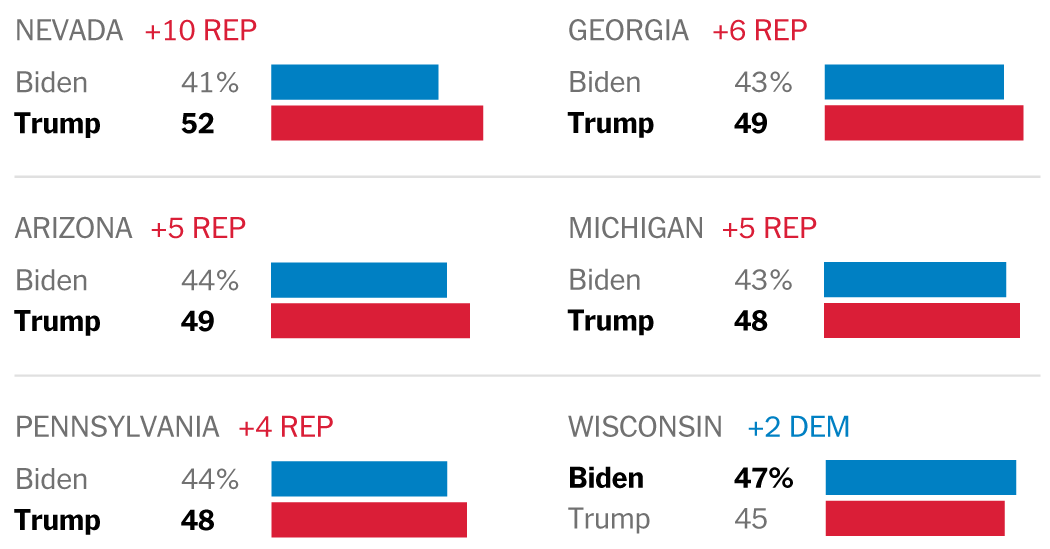President Biden is trailing Donald J. Trump in five of the six most important battleground states one year before the 2024 election, suffering from enormous doubts about his age and deep dissatisfaction over his handling of the economy and a host of other issues, new polls by The New York Times and Siena College have found.
The results show Mr. Biden losing to Mr. Trump, his likeliest Republican rival, by margins of three to 10 percentage points among registered voters in Arizona, Georgia, Michigan, Nevada and Pennsylvania. Mr. Biden is ahead only in Wisconsin, by two percentage points, the poll found.
Across the six battlegrounds — all of which Mr. Biden carried in 2020 — the president trails by an average of 48 to 44 percent.
Discontent pulsates throughout the Times/Siena poll, with a majority of voters saying Mr. Biden’s policies have personally hurt them. The survey also reveals the extent to which the multiracial and multigenerational coalition that elected Mr. Biden is fraying. Demographic groups that backed Mr. Biden by landslide margins in 2020 are now far more closely contested, as two-thirds of the electorate sees the country moving in the wrong direction.
Voters under 30 favor Mr. Biden by only a single percentage point, his lead among Hispanic voters is down to single digits and his advantage in urban areas is half of Mr. Trump’s edge in rural regions. And while women still favored Mr. Biden, men preferred Mr. Trump by twice as large a margin, reversing the gender advantage that had fueled so many Democratic gains in recent years.



I don’t understand, bidens policies didn’t hurt anyone, corporate greed hurt people and cause inflation.
Trump is just going to make that worse by design as his buddies are the corps. On top of that trump will be design make life worse for certain minority groups.
I don’t see how anyone can support that fascist over anyone
Honestly, the simple fact for a lot of people is:
And that’s it. They don’t think about if the change will actually be good or not.
People like simple solutions to problems. In most of our daily lives, solutions are very simple things. For example:
Problem: Trash can smells.
Solution: Take out trash for collection.
Simple, right? It takes no thought or nuance to make that decision for many people in the world.
The fact that the infrastructure and technology and logistics and work behind trash collection services exists and is hugely complicated never occurs to them, and in those moments of needing to take out the trash, it rarely needs to. It’s only when that system breaks down and your trash isn’t collected that most people begin to talk about it.
So when someone comes along promising a simple solution to a complex systemic issue, it’s reassuring to others that this person has a way to control and understand the system that needs fixing. Nobody wants to think about their trash collection services when they’re worried enough about keeping a roof over their head and food on their table. The power of speaking with confidence on a topic is bizarrely effective at convincing people, even if you don’t know anything about a topic.
But there are also many people, through no fault of their own, who are unable to gauge cause and effect in multiple degrees of separation. For example, the city not paying trash collectors might be the issue. And the city might not be paying the trash collectors because they have no money to pay them with. And the city might have no money because it was embezzled by corrupt politicians. And those corrupt politicians might have been elected because they have been redrawing electoral maps to boost their chances, etc. Etc. It’s a lot of moving parts to consider, and difficult to understand the core issues without experience in those industries or disciplines or educational backgrounds. And certainly impossible for anyone to understand all of the problems in society in detail, there are too many, especially now in a global real-time connected world.
And many people might not be able to grasp the complexities because they were stunted by chemical poisoning from local industries, a dismantled educational system, cost-prohibitive medical care and prevention, etc. Etc. They’re both literally and culturally poisoned by systemic issues, and are too ill to dedicate the energy to understand or fix the root causes. No amount of trying to convince someone with evidence is going to address their undiagnosed congenital disability.
There are way way way more people with disabilities out there than the numbers report. And they’re running into constant societal barriers that prevent them from making voting decisions that effectively benefit them and their communities. The simple solutions they are promised by grifters and power-hoatders are the ones that superficially appear to benefit people at the bottom of the social ladder (eg. No inheritance taxes) but actually reinforce existing power imbalance and only benefit the top of the social ladder (eg. Tax only applied to inheritance over $X million dollars).
Realistically, we need to stop poisoning and maiming each other in needless wars, industrial waste, exploitation, and more if we’re going to have a healthy society that can reach their potential to make better decisions that progress the entire human civilisation. For that to happen, the top billion powerful people in the world are going to have to experience significant lifestyle impacts to improve the situation for the other several billion.
Sorry for wall of text, this problem is something I’ve been thinking a lot about lately. I want to fix it but the root cause is something I suspect can’t be significantly altered because it’s ingrained in humanity.